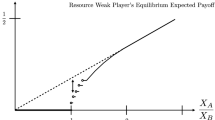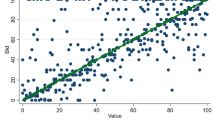Abstract
This paper examines the existence of strategic solutions to finite normal form games under the assumption that strategy choices can be described as choices among lotteries where players have security- and potential level preferences over lotteries (e.g., Cohen, Theory and Decision, 33, 101–104, 1992, Gilboa, Journal of Mathematical Psychology, 32, 405–420, 1988, Jaffray, Theory and Decision, 24, 169–200, 1988). Since security- and potential level preferences require discontinuous utility representations, standard existence results for Nash equilibria in mixed strategies (Nash, Proceedings of the National Academy of Sciences, 36, 48–49, 1950a, Non-Cooperative Games, Ph.D. Dissertation, Princeton University Press, 1950b) or for equilibria in beliefs (Crawford, Journal of Economic Theory, 50, 127–154, 1990) do not apply. As a key insight this paper proves that non-existence of equilibria in beliefs, and therefore non-existence of Nash equilibria in mixed strategies, is possible in finite games with security- and potential level players. But, as this paper also shows, rationalizable strategies (Bernheim, Econometrica, 52, 1007–1028, 1984, Moulin, Mathematical Social Sciences, 7, 83–102, 1984, Pearce, Econometrica, 52, 1029–1050, 1984) exist for such games. Rationalizability rather than equilibrium in beliefs therefore appears to be a more favorable solution concept for games with security- and potential level players.
Similar content being viewed by others
References
Allais, M. (1953), Le Comportement de l’Homme Rationnel devant le Risque: Critique des postulats et axiomes de l’École Americaine, Econometrica 21, 503–546. Reprinted in English as part II in Allais, M. and Hagen, O. (eds.) (1979), Expected Utility Hypotheses and the Allais Paradox, D. Reidel: Dordrecht etc.
Berge C. (1997) Topological Spaces. Dover Publications: Mineola, New York
Bernheim B.D. (1984) Rationalizable strategic behavior. Econometrica 52: 1007–1028
Chew S.H. (1989). Axiomatic utility theories with the betweenness property. Annals of Operation Research 19: 273–298
Cohen M. (1992). Security level, potential level, expected utility: a three-criteria decision model under risk. Theory and Decision 33: 101–104
Crawford V.P. (1990) Equilibrium without independence. Journal of Economic Theory 50: 127–154
Dasgupta P., Maskin E. (1986) The existence of equilibrium in discontinuous economic games, I: theory. The Review of Economic Studies 53: 1–26
Dekel E., Safra Z., Segal U. (1991) Existence and dynamic consistency of Nash equilibrium with non-expected utility preferences. Journal of Economic Theory 55: 229–246
Dow J., Werlang S.C.R. (1994). Nash equilibrium under uncertainty: breaking down backward induction. Journal of Economic Theory 64: 305–324
Eichberger J., Kelsey D. (2000). Non-additive beliefs and strategic equilibria. Games and Economic Behavior 30: 183–215
Ellsberg D. (1961). Risk, ambiguity, and the savage axioms. Quarterly Journal of Economics 75: 643–669
Essid S. (1997) Choice under risk with certainty and potential effects: a general axiomatic model. Mahematical Social Sciences 34: 223–247
Gilboa I. (1988) A combination of expected utility and maxmin decision criteria. Journal of Mathematical Psychology 32: 405–420
Gilboa I., Schmeidler D. (1989) Maxmin expected utility with non-unique prior. Journal of Mathematical Economics 16: 65–88
Ghirardato, P. and Le Breton, M. (1997), Choquet rationality, working paper, mimeo.
Ghirardato P., Le Breton M. (2000) Choquet rationality. Journal of Economic Theory 90: 277–285
Green J.R., Jullien B. (1988) Ordinal independence in nonlinear utility theory. Journal of Risk and Uncertainty 1: 335–387
Gul F. (1991) A theory of disappointment aversion. Econometrica 59: 667–686
Guesnerie R. (2002) Anchoring economic predictions in common knowledge. Econometrica 70: 439–480
Jaffray J.Y. (1988) Choice under risk and the security factor: an axiomatic model. Theory and Decision 24: 169–200
Karni, E. and Schmeidler, D. (1991), Utility theory with uncertainty, in Hildenbrand, W. and Sonnenschein, H. (eds.), Handbook of Mathematical Economics, Vol. IV, North-Holland: Amsterdam etc., pp. 1763–1831.
Klibanoff, P. (1996), Uncertainty, Decision, and Normal Form Games, mimeo.
Hausner (1954). Multidimensional utilities. In: Thrall R.M., Coombs C.H., Davids R.L. (eds) Decision Process. Wiley, New York, etc., pp 167–180
Lo K.C. (1996) Equilibrium in beliefs under uncertainty. Journal of Economic Theory 71: 443–484
Lopes L.L. (1987) Between hope and fear: the psychology of risk. In: Berkowitz L. (eds) Advances In Experimental Social Psychology, Vol 20. Academic, New York, pp 255–295
Moulin H. (1984) Dominance solvability and cournot stability. Mathematical Social Sciences 7: 83–102
Nash, J.F. (1950a), Equilibrium points in N-person games, Proceedings of the National Academy of Sciences 36, 48–49. Reprinted as chapter 5 in H.W. Kuhn, and Nasar, S. (eds.) (2002), The Essential John Nash, Princeton University Press: Princeton and Oxford.
Nash, J.F. (1950b), Non-cooperative Games, Ph.D. Dissertation, Princeton University. Reprinted (facsimile) as chapter 6 in H.W. Kuhn, and Nasar, S. (eds.) (2002), The Essential John Nash, Princeton University Press: Princeton and Oxford.
von Neuman J., Morgenstern O. (1947). Theory of Games and Economic Behavior. Princeton University Press, Princeton (2nd ed).
Pearce D.G. (1984) Rationalizable strategic behavior and the problem of perfection. Econometrica 52: 1029–1050
Quiggin J.P. (1982) A theory of anticipated utility. Journal of Economic Behavior and Organization 3: 323–343
Quiggin J.P., Wakker P. (1994) The axiomatic basis of anticipated utility: a clarification. Journal of Economic Theory 64: 486–499
Schmeidler D. (1989) Subjective probability and expected utility without additivity. Econometrica 57: 571–587
Schmidt, U. (2004), Alternatives to expected utility: some formal theories, in S. Babera, P.J. Hammond, and Seidl, C. (eds.), Handbook of Utility Theory, Vol. II, Chapter 15, Kluwer: Boston.
Schmidt, U. and Zimper, A. (2006), Security- and Potential Level Preferences with Thresholds, mimeo.
Segal U. (1989) Anticipated utility: a measure representation approach. Annals of Operation Research 19: 359–373
Segal U. (1993) The measure representation: a correction. Journal of Risk and Uncertainty 6: 99–107
Starmer C. (2000) Developments in non-expected utility theory: the hunt for a descriptive theory of choice under risk. Journal of Economic Literature 38: 332–382
Tan T., Werlang S.R.C.D. (1988) On Aumann’s notion of common knowledge, an alternative approach. Journal of Economic Theory 45: 370–391
Author information
Authors and Affiliations
Corresponding author
Rights and permissions
About this article
Cite this article
Zimper, A. Strategic games with security and potential level players. Theor Decis 63, 53–78 (2007). https://doi.org/10.1007/s11238-007-9036-4
Received:
Accepted:
Published:
Issue Date:
DOI: https://doi.org/10.1007/s11238-007-9036-4
Keywords
- Allais paradoxes
- equilibrium in beliefs
- Nash equilibrium
- non-expected utility theories
- rationalizability




